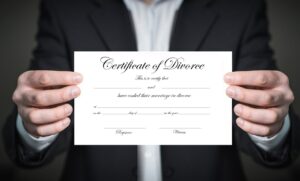Every state has its own rules on divorce and the divorce procedure, so if you and your spouse, or you alone, are considering getting divorced, you need to find out what those rules and procedures are before actually filing for divorce. One of the most confusing parts of the divorce process is the stage called “divorce nisi”. This sounds like you are divorced, right? Wrong! You aren’t yet finally divorced in Massachusetts during the nisi period as the final divorce is still 3 to 4 months away, depending on what type of divorce you filed for.
Assuming you are actually divorced when you aren’t can get you into trouble. Your separation agreement you signed with your spouse and was necessary for a divorce to be approved may be active after the decree of nisi has been issued, but more seriously, if you get married again, while still in the nisi period, you could be charged with the offence of bigamy or at least have your marriage rendered invalid. To avoid any potential problems or embarrassment, it pays to review the Massachusetts divorce procedure, and if the rules don’t seem to make sense to you, ask a divorce attorney for clarification and advice.
No fault and fault divorces in Massachusetts
The time you have to wait for a final divorce depends partly on the type of divorce you opt for. There are two main types of divorce: fault and no-fault.
Most divorces are what are called no-fault divorces. These are when you, or both you and your spouse, have decided that your relationship is over and not viable any more. This is called an “irretrievable breakdown in the marriage”. You may have separated from each other already, but this isn’t strictly necessary in Massachusetts to have a divorce approved (a period of separation is necessary in some other states).
In Massachusetts, a no-fault divorce is either a 1A (uncontested) or a 1B (contested) divorce. Either one of you as spouses can file a petition for a 1A divorce in the Probate and Family court, but before you do that you will need to work out a separation agreement together and sign it. A separation agreement deals with what happens to marital property and your joint children and other dependants after the divorce has been finalized.
This can be contentious and may lead to a contested divorce. A contested divorce, or 1B divorce, is when both spouses agree that the marriage has broken down irretrievably, but cannot agree on the terms of separation, i.e. have not signed a separation agreement. A complaint for divorce rather than a petition is used for a 1B divorce. The spouse who files the complaint is known as the complainant rather than the petitioner.
It is better, cheaper and faster to work through the separation agreement together, and seek help through a divorce mediator or attorney if you are finding agreement difficult. For a 1A divorce, you both need to sign a statement that your marriage has irretrievably broken down and provide a separation agreement which must be signed by both of you and notarized before it will be accepted by the court. Once this has happened, the court will issue a date for a divorce hearing, which you are both expected to attend. At the hearing, the judge will go through the separation agreement with the two of you and confirm that your marriage is indeed irretrievably broken down. After the hearing, it will take some time before the divorce is approved. For a 1A divorce, this is usually not very long, but for a 1B (contested divorce) may be several weeks. You will then be notified of the decree nisi. This is where some confusion is involved as it doesn’t actually mean you are divorced yet! There will be more about this difference later in this article.
A fault divorce is when one of the two spouses files for divorce based on alleging that the marriage has become unviable due to the ‘fault’ of the other spouse. Massachusetts recognizes seven reasons for seeking a fault divorce. These include: cruelty, abandonment or desertion for more than 12 months, impotency, imprisonment for more than 5 years, intoxication, adultery, refusal to support the other spouse where support is possible. Fault divorces may be sought by one of the two spouses hoping that the divorce leads to better terms of separation than if a no-fault divorce had been sought.
The decree nisi: the transition from marriage to divorce
In the Massachusetts divorce process, once a hearing has occurred, it will take a period of time before the divorce is approved by the court. When this time comes, a decree of ‘nisi’ is made. This is a provisional status which allows either spouse to change their minds about ending the marriage or to dispute the separation agreement or decide jointly to change the terms of the agreement. Note that trying to change a separation agreement after it has already been approved by the court can be problematic. The period between the decree nisi and the judgment absolute, when the divorce is finalized is called the divorce nisi period and in this period, the marriage has not legally ended. The marriage actually only ends when the divorce is finalized at the end of the nisi period.
The length of time it takes between the decree nisi being issued and the final divorce date depends on the type of divorce that was sought. A contested divorce, i.e. a 1B divorce, will mean 90 days of divorce nisi period, while an uncontested, or 1A divorce, will take 120 days between the nisi notification and the final date of divorce, i.e. judgment absolute. Once this date has elapsed, the two spouses can be assured that their marriage is over and can re-marry if this is what either intended to do. The separation agreement and the arrangements for property distribution, child and spousal support, child custody and visitation rights remain current until at some future stage when one or both ex-spouses seeks to change the terms of the agreement, which will require approval by the Family Law court.
For more information, visit our website Mucci Legal or contact us for a free initial legal consultation today.


